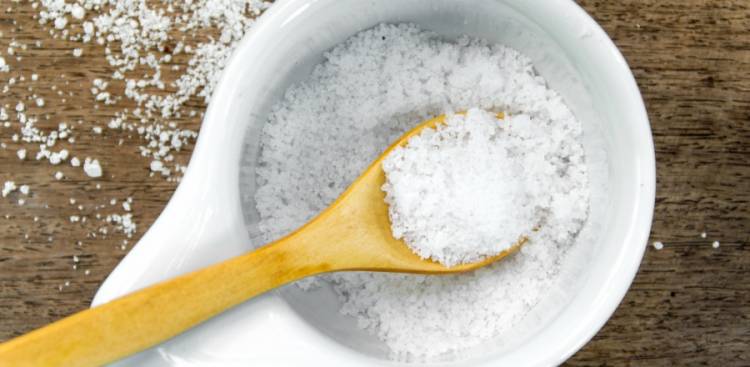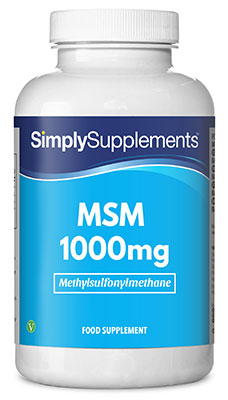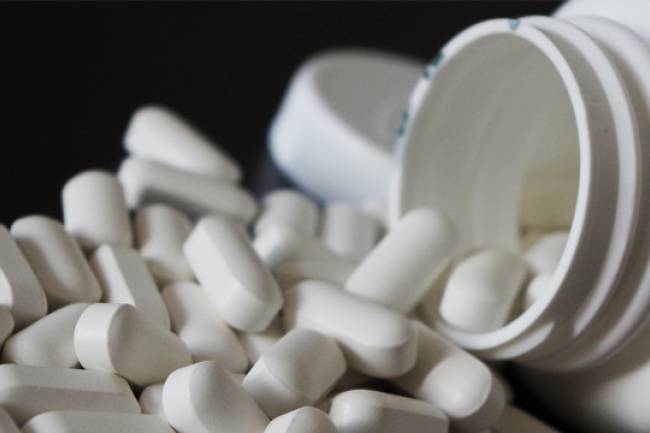Health Benefits of MSM (Methylsulfonylmethane)

Sulphur is one of the most abundant elements in the body. Keeping levels at a healthy level can be important to many structures that we use every day. You might not know it, but a supplement like MSM may be more important to you and your health than you think.
MSM is an organic sulphur commonly used to treat arthritis, sporting injuries and tendonitis. It is thought that it supports joint function by reducing inflammation and promoting the repair of joint tissues. MSM is popularly taken in supplement form, however creams are also available.
What is MSM?
MSM, also known as methylsulfonylmethane, is a stable source of sulphur that is naturally found in the human body, plants and animals. In the body, sulphur is a key building block of joint cartilage and is directly involved in the production and strengthening of collagen molecules. The elastic nature of collagen adds “bounce” to cell membranes, helping to keep them flexible and plump.
As we age, collagen production declines, which means that our joints don’t bounce back from injuries as quickly as they once did, and often become stiff and painful. Adding MSM to the diet may help to replace lost supplies.
Alongside this, there’s evidence to suggest that MSM can have an effect on inflammation in the body. We know inflammation mainly for its effect on joint pain and swelling, but it it’s a process that occurs all over the body, as a reaction to injury and infection. It can even occur after exercise – something we’ll mention later.
MSM Benefits
Most of the studies examining the health benefits of MSM have been short-term, on average around three months, although research is ongoing. So far we’ve found the key benefits of MSM to be:
Osteoarthritis
With MSM playing a part in the maintenance of joints, it’s natural to connect the supplement and arthritis. It works on two fronts to support osteoarthritis: as a supplement that guards against inflammation and as a component in cartilage. With cartilage loss being the main point of failure in osteoarthritis, anything that may help to keep it healthy will be a boon. So too will a supplement that lowers the swelling and aching that using these joints accrues. So, what does the science say on this matter?
One study combined MSM with glucosamine, another joint-supporting compound. In the trial, 118 patients with osteoarthritis of the knee were split into four groups; patients in the first group took 1500mg of glucosamine daily; those in the second group took 1500mg of MSM; those in the third group took both glucosamine and MSM, and patients in the fourth group took a placebo. At the end of the 12-week trial, findings showed that glucosamine, MSM and their combination significantly improved knee pain and movement, compared to the placebo.
Muscle Recovery After Exercise
During intense exercise, muscles become damaged and painful (this will be a familiar sensation to gym regulars) but also another process happens in the body: oxidative stress. This is where damage to cells on a molecular level occurs, due to exercise increasing the production of free radicals: molecules that cause said cell damage.
One short-term study found that daily supplementation with 3000mg of MSM helped to significantly reduce muscle soreness when pain levels were measured 48 hours after exercise. It is thought that MSM may also help to prevent further joint damage caused by exertion during exercise by eliminating waste products at a cellular level and speeding up cell recovery.
Skin Care
Remember how we mentioned that MSM helps replenish collagen in the joints? That’s also distributed to the skin, too. You might be familiar with the swathes of skin products boasting about their collagen content, and for good reason; collagen helps to maintain skin elasticity, keeping it looking youthful.
Its anti-inflammatory effects can assist the look of certain blemishes, too. One oft-cited study focuses on a condition called rosacea, characterised by redness, large spots and visible blood vessels. MSM combined with silymarin was tested against rosacea in 46 patients; it was found to improve “skin redness, papules, itching, hydration, and skin colour”.
Haemorrhoids
The way in which MSM enhances the body’s protection against inflammation is said to be useful against haemorrhoids. While there’s not a huge amount of research in this area, one piece looked at its effectiveness when combined with hyaluronic acid and tea tree oil in a gel. After 14 days it was shown to “significantly reduce all the symptoms… compared to [a] placebo”.
Hair Loss
Collagen is needed for the maintenance and growth of healthy hair, and so it is thought that MSM may have a beneficial effect on the strength and integrity of hair follicles and strands. Sulphur is also an important ingredient in keratin, the primary protein in hair.
Allergies
There is some evidence to suggest that MSM’s anti-inflammatory benefits may offer some relief from the symptoms of hay fever, including respiratory congestion and itching.
How Much Should I Take?
MSM occurs naturally in foods such as nuts, milk and raw cabbage, but there’s a miniscule amount contained in them, even by supplement standards. It’s also vulnerable to heat, so these foods need to be eaten raw – not the most appetising to certain people, not to mention the intolerances and allergies that may come with dairy and nuts.
In supplement form, take up to 6000mg per day divided into two to three doses. There are two types of MSM supplements: crystallised and distilled. Crystallised MSM is less expensive, but can contain impurities and heavy metals from the organic sulphur. In comparison, distilled MSM undergoes a process to completely remove contaminants and so is considered to be a superior quality. For this reason, always opt for MSM which has been purified by distillation.
There is no evidence to support the use of MSM during pregnancy, and so supplementation should be avoided during this period to err on the side of caution.
MSM Side Effects and Interactions
With our current knowledge, there’s no serious widespread side effects (it’s been proven to be safe over a course of six months). In very rare cases there may be cases of diarrhoea and other gastrointestinal irritation.
In addition to this, there are no known interactions with prescription medications. There are some reports that may indicate MSM acts as a blood thinner in some cases, however; if you have any concerns please consult a doctor before taking any MSM supplements.
Conclusion
MSM might be a complex and relatively unknown compound, but it can assist the body in some important ways. Many parts require sulphur – the joints, skin and hair which MSM can help deliver, and its anti-inflammatory effects can affect bodily processes and healing. Do not overlook it when planning your next supplement regiment—especially if you’re having trouble with arthritis.
Sources:
https://www.webmd.com/vitamins-and-supplements/msm-methylsulfonylmethane-uses-and-risks#2
https://www.ncbi.nlm.nih.gov/pmc/articles/PMC5097813/

 Nicole
Nicole 






























